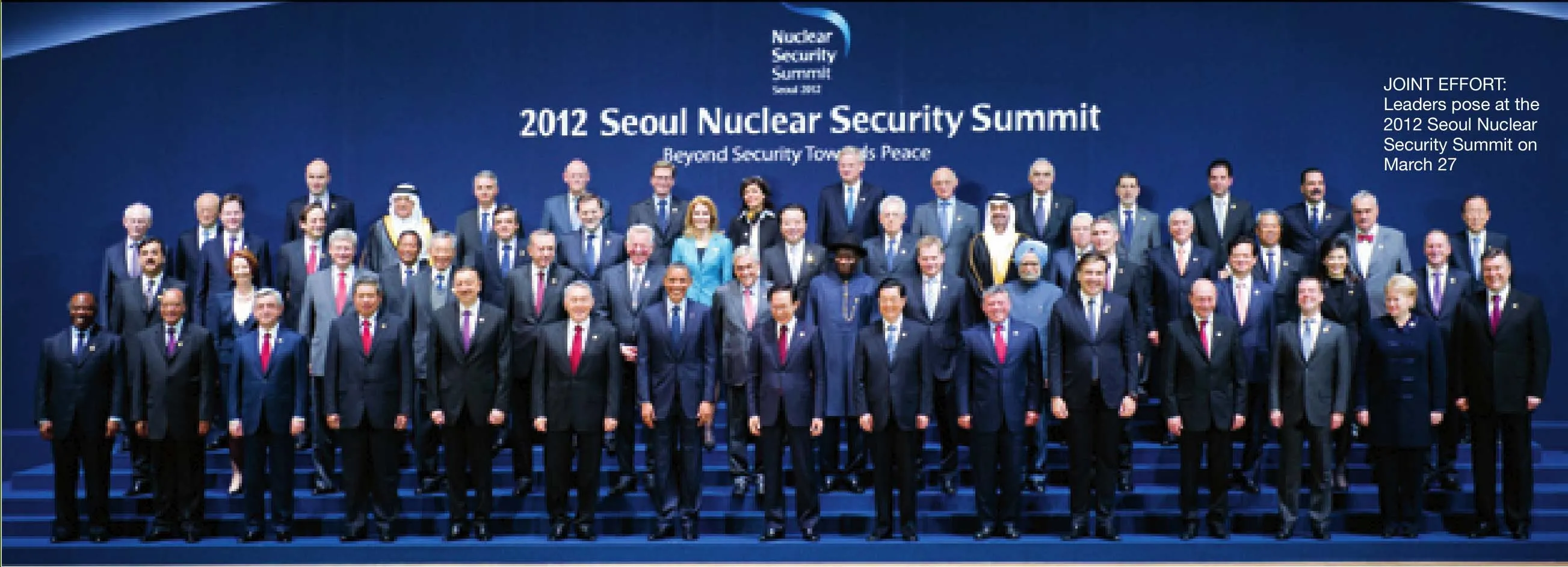A Secure Nuclear Future
Seoul summit brings world together on nuclear security By Ding Ying
A Secure Nuclear Future
Seoul summit brings world together on nuclear security By Ding Ying
Nuclear power can be a gift or a curse, depending on whether it is used as a clean energy source or a destructive weapon. Nuclear power is still an important source of irreplaceable clean energy. Therefore, the best way is to maximize its advantage in civilian use while protecting nuclear security.
The urgency of enhancing nuclear safety and security requires nuclear states and related organizations to take practical measures to lower the risks of radiation accidents and illegal trading of nuclear materials through international cooperation.
This is one of the agreements reached at the 2012 Seoul Nuclear Security Summit held on March 26-27 in the South Korean capital.In a joint communiqué, leaders emphasized the need to minimize the civilian use of highly enriched uranium that can be used to produce bombs. They vowed to work together to achieve the “shared goals of nuclear disarmament, nuclear non-proliferation and peaceful uses of nuclear energy.”
Building consensus
Zhu Xuhui, a researcher with the China National Nuclear Corp. and an expert in uranium enrichment and nuclear fuel, said a big move at this summit was encouraging the reduction of weapons-grade nuclear materials, including uranium enriched to a purity of at least 90 percent, and plutonium. There are about 1,750 tons of weapons-grade nuclear materials in the world—1,500 tons of highly enriched uranium and 250 tons of plutonium,which can be used to create nearly 126,000 nuclear weapons. The United States and Russia possess 95 percent of these materials.
“Since Russia and the United States own the majority of the world’s weapons-grade nuclear materials, they should start the reduction first. Then other countries must follow their steps,” Zhu said.
In 1993, Russia and the United States signed an agreement under which Russia agreed to convert 500 tons of weapons-grade uranium to low enriched uranium in the following 10 years, and the United States agreed to purchase all the converted material. The United States also promised to reduce highly enriched uranium during the same period, Zhu said.
In addition, the two nuclear giants are implementing an agreement that will result in the removal of 68 tons of plutonium.
The Seoul summit made great progress as it paid equal attention to the safety of nuclear power plants and the security of nuclear materials and facilities, said Qu Xing, President of the Chinese Institute of International Studies.
The summit, the second high-profile nuclear security event following the 2010 summit in Washington, D.C., was held a year after the nuclear disaster at Japan’s Fukushima Daiichi Nuclear Power Plant. Radiation leaks triggered by the devastating earthquake and tsunami in northeast Japan on March 11 last year once again highlighted the importance of nuclear safety.
One country’s nuclear accident, whether leaks at a nuclear power plant or a terrorist nuclear attack, will not only affect the country itself, but have far-reaching and long-lasting consequences, Qu said.
Today, more countries possess, or desire to possess, nuclear power than ever before.For example, about 60 countries have reported to the International Atomic Energy Agency(IAEA) for building new nuclear power plants. As a result, the number of nuclear power plants and facilities and the quantity of stored nuclear materials are bound to increase.
There have been growing worries about the malicious use of nuclear materials by terrorists.Long-distance transportation makes it easier for terrorists to acquire nuclear materials, Qu said.

G JINGWEN
A sensible approach
Being an emerging economy with high energy demand, China will continue to develop nuclear power for civilian use and improve nuclear power-related technologies, experts said. At the same time, it should also join international efforts to protect nuclear security.
China has taken active steps to enhance nuclear security and made substantive achievements in recent years. According to the National Progress Report on Nuclear Security China released during the Seoul summit, China has cooperated with the IAEA, the United States and other countries in conducting 20 training courses and seminars for more than 500 nuclear security workers since April 2010.
The report said China and the United States are jointly constructing the Center of Excellence on Nuclear Security in Beijing.The IAEA and Canada have also expressed interest in participating in its construction. It said authorities have already fi nished assessing security systems at operational nuclear power plants all over the country.
In his speech at the summit, Chinese President Hu Jintao stated China’s stance on nuclear security and the future development of nuclear energy.
Stressing that the common goal of universal nuclear security can only be achieved with concerted efforts of all countries, Hu put forward a four-point proposal on enhancing nuclear security:
● following a scientific and sensible approach to nuclear security and boosting con fidence in the development of nuclear energy;
● strengthening nuclear security capacity building and living up to national responsibility for ensuring nuclear security;
● deepening international exchanges and cooperation and improving nuclear security around the world; and
● taking a comprehensive approach and addressing both the symptoms and root causes of nuclear proliferation and nuclear terrorism.
“China is a nuclear state with advanced nuclear technologies. President Hu’s calls for a ‘scientific and sensible approach to nuclear security’ are important for boosting the world’s con fi dence about the development of nuclear energy,” said Li Hong, Secretary General of the China Arms Control and Disarmament Association.
China plans to expand its nuclear power capacity to 80 million kilowatts by 2020. By then, non-fossil energy will account for 15 percent of the country’s primary energy consumption, as compared to 8.9 percent in 2011.
In light of its ambitious nuclear power development plan, safeguarding nuclear security serves China’s own interests, Li said. Moreover,it should promote international cooperation in nuclear security by sharing its experience with others, providing personnel training on nuclear security and helping other nuclear states to convert highly enriched uranium reactors to low enriched uranium ones.
reports of 2,164 cases of illegal trading of nuclear materials or radioactive materials,about 120 cases every year on average. Qu said there were more similar cases throughoutthe world that have never been reported. More international efforts should be made to strike illegal cross-border nuclear material trading,he said.

